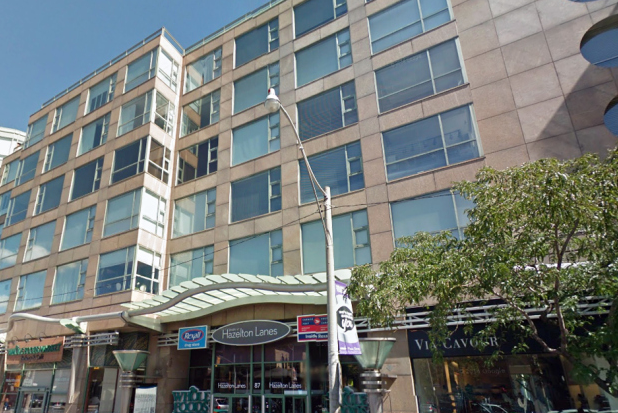Mall War: How Redevelopment of the former Hazelton Lanes sparked a poisonous feud in wealthy Yorkville
Tuesday Jul 21st, 2015
MALL WAR
How Redevelopment of the Former Hazelton Lanes Sparked a Poisonous Feud in Wealthy Yorkville
The Great Battle of Yorkville broke out into active combat in the fall of 2014, when June Mitchell, an 86-year-old grandmother, staged a sit-in at a mall developer's office. It was nearing Yom Kippur, the Jewish high holiday, and Mitchell had a dinner planned. She had the food set and the timing down. Everything was ready to go. Until, all of a sudden, it wasn't.
Eight days before her dinner, Mitchell learned First Capital Holdings, the developer renovating the mall attached to her condo building, planned to shut her power off on Yom Kippur weekend. For Mitchell, it was the last straw. After three years of squabbles with First Capital, she'd had enough. No power meant no family dinner. And Mitchell, who occupies the no-nonsense end of the grandmother spectrum, was not about to let that happen.
"It's like turning off the lights at Christmas," she says. "How is Santa Clause going to get there?"
Mitchell marched - limped, really, she had a problem with her knee - into First Capital's construction office. She sat down and refused to leave until a manager saw her. Esther Cohen, another grandmother, with her own dinner plans, followed. "I said 'Consider this a sit-in'" she says. Other residents followed.
It's an incident that has come to be known in local lore as the "Yom Kippur Rebellion." And it was, remarkably, neither the first nor the last explosion of bad blood between the well-heeled residents of 77 Avenue Road and the mall's owners.
The fight - over renovations and power and courtesy - has stretched on for more than three years, winding its way in and out of court, and leaving feelings bruised on all sides.
The residents accuse the mall of, among other things, shutting off their power without notice, tearing out expensive shared equipment without consultation, and eradicating a fire exit on their terrace. The mall developers, meanwhile, claim they have done everything they can to accommodate the condo owners, while doing renovations that benefit everyone in the long run.
What's clear is that some owners have come to hate the developer in a visceral way.
"They despise First Capital," says Marilyn Snead, president of the condo board. "They're boycotting the mall."
With the renovations nowhere near complete, the fight looks set to drag on for years, roiling up tempers in a tony Toronto enclave and highlighting the problems that can come when residential and commercial real estate intertwine.
The roots of the struggle trace back to that very mixing. From the outside, the condo complex and the mall look like one building. They share a common exterior, but have separate entrances. The mall, which used to be known as Hazelton Lanes and includes a Whole Foods grocery store, takes up most of the street level, while the condo, which has 71 units, stretches six storeys above and behind it.
The two were built together by the same developer in 1991. But they were set up as separate legal corporations, with contracts governing how they interact. The mall and the condo corporation share utilities, the parking lot and some core services. Both are geared to a luxury clientele; a two-bedroom penthouse in the condo building, for example, was listed at $2.6-million in 2013.
For 20 years, the two got on fine, says Snead. Under previous owners, issues over bills or equipment, were worked out amicably, face to face. But that changed when First Capital Realty took over, she says. A large, publicly traded company, First Capital is based in Toronto, but owns retail properties across Canada. It bought Hazelton Lanes in 2011 through its wholly owned subsidiary, First Capital Holdings.
The first fight between the new mall owner and the condo corporation started over bills. But it quickly degenerated into more serious issues.
According to court documents, First Capital allegedly replaced boilers, chillers and other equipment with no notice to the condo corporation and without telling the owners how much they would be expected to pay for the new gear. That work left the condo building without heat last fall. "The hallways were freezing cold and many owners were complaining," wrote Nataliya Lysenko, the condo's building manager, in a signed affidavit.
The main battle started when First Capital announced plans to overhaul the mall. At first, many residents were enthusiastic about the idea to sink $100-million into a complete revamp of the dated strcuture and rebrand it Yorkville Village.
"I think it's great, to tell you the truth," says condo owner Karen Ritchie. But the process, some residents say, has been "hell".
In November 2014, First Capital sued the condo corporation, seeking access to its property to carry out renovations. The condo corporation countersued, setting off a bitter string of legal squabbles. According to court documents, First Capital allegedly blew out one set of the condo's breakers during construction, took out building permits in the condo's name without its permission or knowledge, and scheduled and rescheduled power and heating outages with little or no notice to residents.
It was one such outage that led to the Yom Kippur showdown. Another fight over one weekend devolved into a tit-for-tat court battle over compensation for residents who planned to move out for the weekend.
According to a binding arbitration decision released in May, the condo's lawyer asked for $2500 for each resident to cover two nights in a hotel. When First Capital's lawyer countered with an offer of $350/night, which he submitted would cover a deluxe king room at Yorkville's five-star Hazelton Hotel, the condo's lawyer reacted with outrage.
"The people who live in 77 Avenue Road, perhaps the most exclusive neighbourhood in Toronto, are not homeless refugees or cattle to be herded en masse into 'group rate' hotel rooms," he wrote, according to the arbitration ruling - again, referring to a deluxe king room at a hotel described as "the ultimate luxury" in Toronto. "This suggestion is disrespectful and offensive."
In the end the arbitrator sided with First Capital.
Snead believes First Capital's goals is to "crush the condo" corporation in an endless avalanche of legal filings. "When First Capital wants to tell you something, they sue you," she says.
"Their thing is, 'We can just do whatever we want,' ", adds Ritchie. "We're bigger than you, and you'll just have to sue us."
First Capital Shpigel denies the claims.
"Looking back, there were many meetings between us and the condominium," she says. "Perhaps there should have been more or could have been more. But I do believe that we communicated as best we could have."






Post a comment